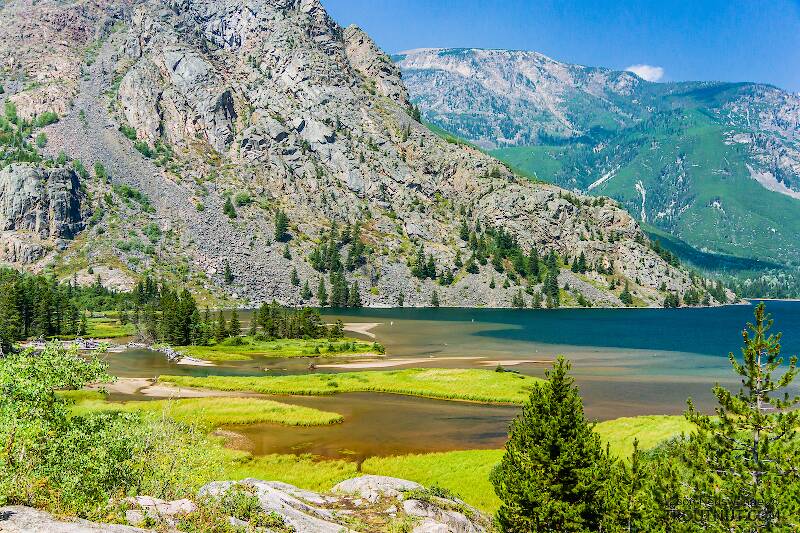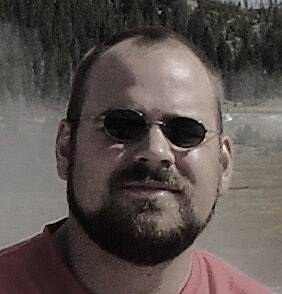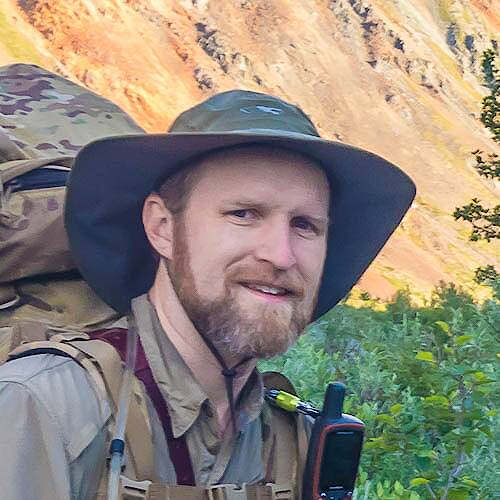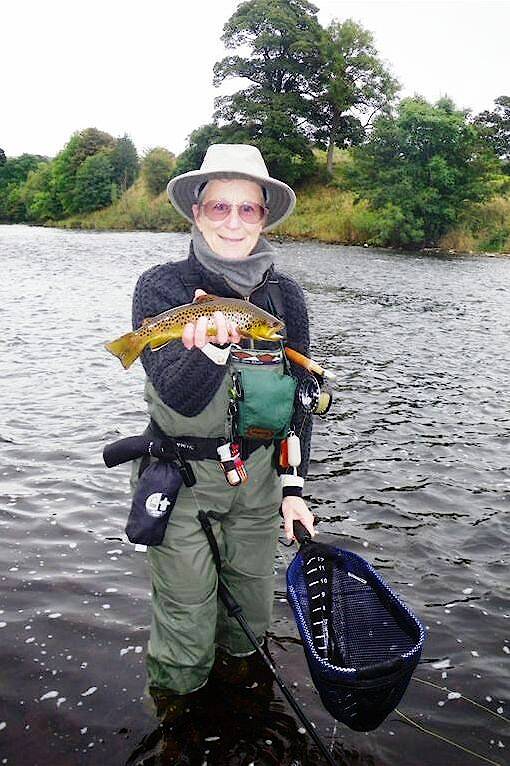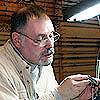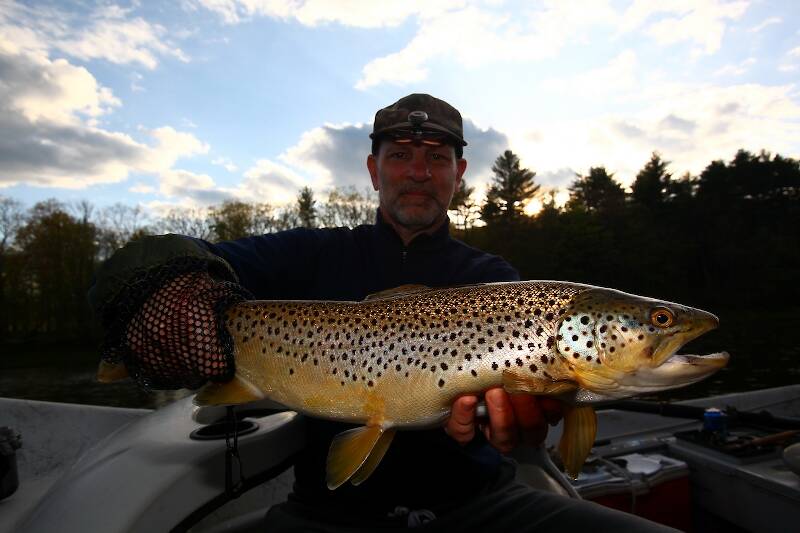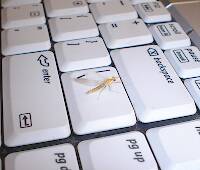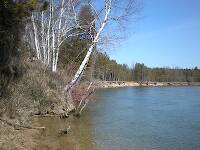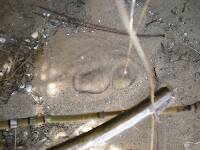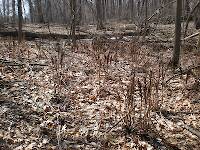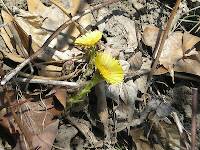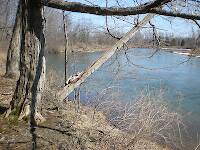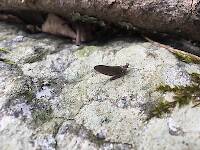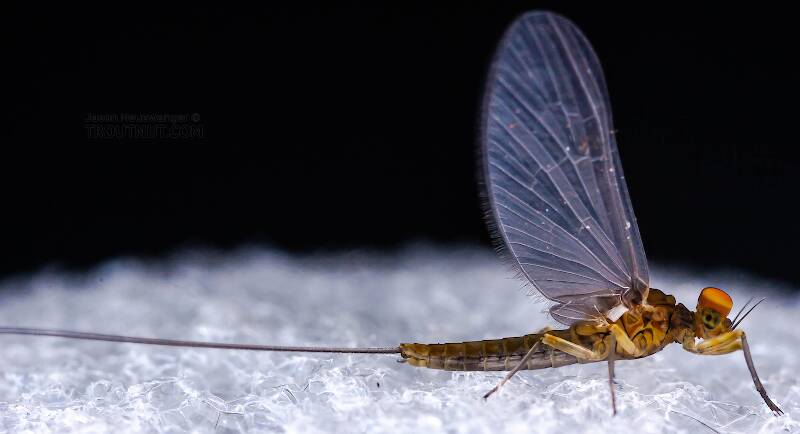
Blue-winged Olives
Baetis
Tiny Baetis mayflies are perhaps the most commonly encountered and imitated by anglers on all American trout streams due to their great abundance, widespread distribution, and trout-friendly emergence habits.
Featured on the forum
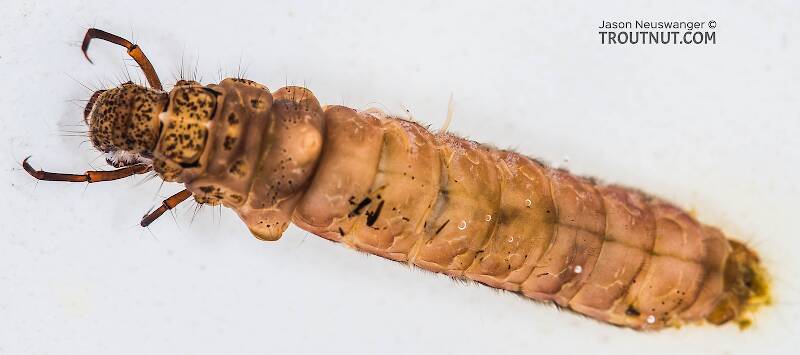
This specimen appears to be of the same species as this one collected in the same spot two months earlier. The identification of both is tentative. This one suffered some physical damage before being photographed, too, so the colors aren't totally natural. I was mostly photographing it to test out some new camera setting idea, which worked really well for a couple of closeups.

Troutnut is a project started in 2003 by salmonid ecologist Jason "Troutnut" Neuswanger to help anglers and
fly tyers unabashedly embrace the entomological side of the sport. Learn more about Troutnut or
support the project for an enhanced experience here.
Aaron7_8 on Dec 27, 2008December 27th, 2008, 3:35 pm EST
Being new to the sport what is the best reading material for good techniques. Thanks for the help.
Troutnut on Dec 27, 2008December 27th, 2008, 4:55 pm EST
For casting, I don't really know. For the basics of fly selection and presentation, and general understanding of the fish, these were some of the most helpful books for me when I started about five years ago:
The Orvis Guide to Prospecting for Trout
The Orvis Guide to Reading Trout Streams
No Hatch to Match
Of course, this forum has plenty of good information, too.
The Orvis Guide to Prospecting for Trout
The Orvis Guide to Reading Trout Streams
No Hatch to Match
Of course, this forum has plenty of good information, too.
Jason Neuswanger, Ph.D.
Troutnut and salmonid ecologist
Troutnut and salmonid ecologist
CaseyP on Dec 28, 2008December 28th, 2008, 5:53 am EST
for casting, get a video or DVD; words cannot convey physical motion very well. the library might have one, or you could try a fly shop. lots of shops have informal lending libraries of videos.
then, after you watch the video for a while, go out and practice--without a hook. after a while, get a pal to make a video of you casting, or tie the camera to a tree and do it yourself. then compare that to the professional video.
30 seconds of comparison made a huge difference to my casting, so i recommend it highly. i still do it a couple times a year.
then, after you watch the video for a while, go out and practice--without a hook. after a while, get a pal to make a video of you casting, or tie the camera to a tree and do it yourself. then compare that to the professional video.
30 seconds of comparison made a huge difference to my casting, so i recommend it highly. i still do it a couple times a year.
"You can observe a lot by watching." Yogi Berra
Softhackle on Dec 28, 2008December 28th, 2008, 6:21 am EST
There are many, many good books available. I might suggest Lefty Kreh's "Presenting The Fly". It covers casting, techniques, tackle, etc.
Another older, but thoroughly good book is Art Lee's " Fishing Dry Flies For Trout On Rivers And Streams". While I'm primarily a wet fly man, myself, Lee's book covers basic stuff and technique which is applicable across the board.
These are just the tip of the iceberg,
Mark
Another older, but thoroughly good book is Art Lee's " Fishing Dry Flies For Trout On Rivers And Streams". While I'm primarily a wet fly man, myself, Lee's book covers basic stuff and technique which is applicable across the board.
These are just the tip of the iceberg,
Mark
"I have the highest respect for the skilled wet-fly fisherman, as he has mastered an art of very great difficulty." Edward R. Hewitt
Flymphs, Soft-hackles and Spiders: http://www.troutnut.com/libstudio/FS&S/index.html
Flymphs, Soft-hackles and Spiders: http://www.troutnut.com/libstudio/FS&S/index.html
Leakywaders on Dec 30, 2008December 30th, 2008, 9:22 am EST
I'll repeat Troutnut's suggestions, and add TROUT by Ray Bergman. I was sent to the local library for TROUT when I was 13. Couple years later they had to put a new card in the book becouse the old one was filled,,, with my name. When I turned 16, parents gave me my own copy, but I had memorized it by then. CURTIS CREEK MANIFESTO, is also good (out of print - used book store). All of these need to be read and reread. If you don't you will do something wrong, then remember you read the right way just after. The feeling is known as humility.
When you start to tie flies the best book is by H.G.Tappley. You will have to find it in a used book store, found mine 5 years ago.
Most of the good books are out of print, so find the used book stores, and do a monthly tour. Most have nothing, but I found 2 in my area that have extensive fishing sections (not giving names - I would rather give the name of my favorite trout stream).
A quick estimate of the books in my collection gives over 200 titles (asked Anne to count them for me, but I can't repeat what she said). All that being said, the thought I wnat to leave you with is: an hour on the stream is worth about 4 hours reading. Buy a cheap line for your rod, and go out and practice casting on the snow (the snow/ice will take the finish off). The hard part is trying to remember what you did when the fly actually goe's where you want it. Put your rod where you will bump into it, and practice every day you can. You have to be good enough so you can put the fly where you want it, without thinking about how to do it. As soon as the ice melts practice on bluegills when you can't get to a trout stream.
Oh, and if you are not married, don't get married.
When you start to tie flies the best book is by H.G.Tappley. You will have to find it in a used book store, found mine 5 years ago.
Most of the good books are out of print, so find the used book stores, and do a monthly tour. Most have nothing, but I found 2 in my area that have extensive fishing sections (not giving names - I would rather give the name of my favorite trout stream).
A quick estimate of the books in my collection gives over 200 titles (asked Anne to count them for me, but I can't repeat what she said). All that being said, the thought I wnat to leave you with is: an hour on the stream is worth about 4 hours reading. Buy a cheap line for your rod, and go out and practice casting on the snow (the snow/ice will take the finish off). The hard part is trying to remember what you did when the fly actually goe's where you want it. Put your rod where you will bump into it, and practice every day you can. You have to be good enough so you can put the fly where you want it, without thinking about how to do it. As soon as the ice melts practice on bluegills when you can't get to a trout stream.
Oh, and if you are not married, don't get married.
Drag free??? If the fly didn't drag, I wouldn't know where it was!!
DGC on Dec 30, 2008December 30th, 2008, 10:15 am EST
The basics on fly rods, reels, lines, leaders etc can be found easily on line. No need to buy an introductory book, and no need to spend absurd amounts of money on equipment, either.
Get Joe Humphreys's Trout Tactics, Expanded edition. This is always the first book I suggest to new fly fishers looking to get a head start in building their knowledge and skills.
Experienced anglers who haven't read it would also be well served.
Get Joe Humphreys's Trout Tactics, Expanded edition. This is always the first book I suggest to new fly fishers looking to get a head start in building their knowledge and skills.
Experienced anglers who haven't read it would also be well served.
Martinlf on Jan 1, 2009January 1st, 2009, 7:25 am EST
I believe the best thing to become a more effective flyfisher that you can do for yourself as a beginner is to find a good casting instructor, work with him or her, practice for a few months daily (or as much is possible) on the lawn, go back to your instructor to see what bad habits you've picked up, get rid of them with more instruction, then practice some more etc. etc. Smooth casting at a variety of speeds, heights, and distances will make or break your ability to present flies, especially dry flies, if that's a style of fishing you want to learn. I try to work with an instructor yearly, and have had the good fortune to live near Bob Clouser, who is a superb teacher. The money will be more than worth it, and if you nip bad habits in the bud you'll save yourself a lot of grief and frustration. After that, DVD's and books will begin to fill in a lot of useful information. Lefty Kreh and Joan Wulff have some good ones, and besides what others have already listed I like Joan Wulff's Fly Casting Accuracy. You can probably go out and catch fish right away under the right circumstances, but as you encounter a greater variety of situations, learning the technique and having the right equipment for the circumstance will pay off.
Ultimately, though, if you're having fun, nothing else really matters in my book. So take all suggestions with a grain of salt, and keep a sense of humor.
Ultimately, though, if you're having fun, nothing else really matters in my book. So take all suggestions with a grain of salt, and keep a sense of humor.
"He spread them a yard and a half. 'And every one that got away is this big.'"
--Fred Chappell
--Fred Chappell
Hellgramite on Jan 1, 2009January 1st, 2009, 8:36 am EST
When i picked up my first fly rod 20 years ago i played in the back yard,front yard, the park you name it.I could hit a rock at 25 feet.Then i went to a local stream and couldn't control anything, all the casting i did ment nothing.So i hired a guide and he showed me how to control the line on moving water,how to mend the line and so on.I think every one has there own style.I found that i just had to find it.Yes there are different types of casts used if you are around trees,brush or open areas.But the only way i found to be able to fish many types of water is to get out and do it.
Aaron7_8 on Jan 1, 2009January 1st, 2009, 1:16 pm EST
Thanks for all the great tips. I look for to trying out some of the suggestions when the time/money come around. tight lines
GoofusBug
Posts: 31
Posts: 31
GoofusBug on Jan 1, 2009January 1st, 2009, 4:32 pm EST
Taking Trout by Dave Hughes
Head to the library and read the back issues of Field & Stream. Lots of fundamentals there.
Head to the library and read the back issues of Field & Stream. Lots of fundamentals there.
Martinlf on Jan 1, 2009January 1st, 2009, 5:24 pm EST
Hellgramite makes a good point. You also must work on moving water. I was of course assuming you'd do that. But I'd still recommend practicing as often as possible. If you live on a stream, you could practice there. I don't, so I practice casting on the lawn. It's helped me catch more and bigger fish in some situations.
"He spread them a yard and a half. 'And every one that got away is this big.'"
--Fred Chappell
--Fred Chappell
Quick Reply
Related Discussions
Topic
Replies
Last Reply
1
Oct 24, 2008
by Brookyman
by Brookyman
1
Apr 11, 2011
by Jmd123
by Jmd123
1
Apr 19, 2017
by Troutnut
by Troutnut

